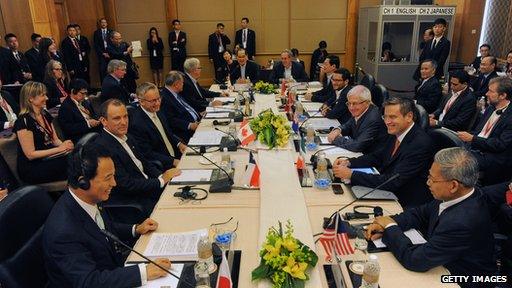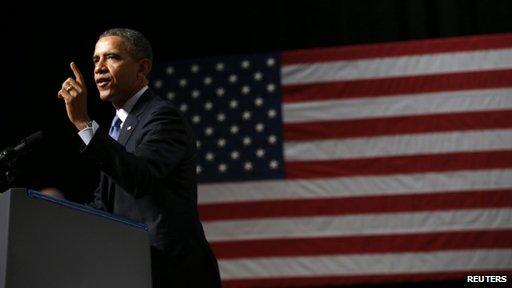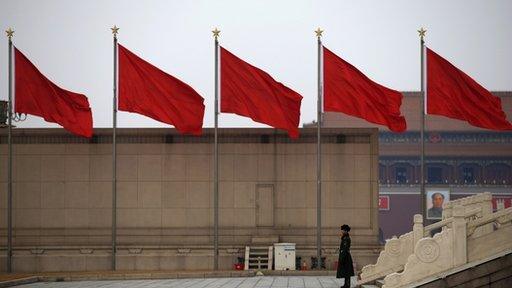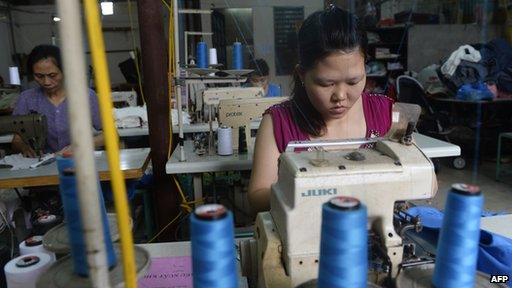TPP: What's at stake with the trade deal?
- Published

The Trans-Pacific Partnership (TPP) will cover 40% of global trade
It is poised to be the world's biggest ever free trade deal and possibly its most ambitious. A dozen countries are negotiating the Trans-Pacific Partnership (TPP), which if successful, will account for two-fifths of world trade.
Those countries are the US, Japan, Brunei, Malaysia, Vietnam, Singapore, Australia, New Zealand, Canada, Mexico, Chile and Peru.
But will pushing through such a pact prove too gargantuan a task? And will China continue to be left out of talks?
Four experts give their views on what's at stake for the US, Japan, China and Vietnam.

US: 'Strategically significant'

President Obama, together with Japanese Prime Minister Shinzo Abe, are the main TPP negotiators
Joshua Meltzer, Brookings Institution:
US President Barack Obama's trip to Asia this week and his meetings with Japanese Prime Minister Shinzo Abe and South Korean President Park Geun-hye present an important opportunity to refocus attention on the TPP.
It is the most significant trade agreement the US is negotiating, representing 40% of world trade and a destination for over 60% of US exports.
As importantly, the TPP is strategically significant as it is the economic dimension of a broader US rebalancing towards Asia.
The two largest economies involved in the TPP are the US and Japan. Their intensive bilateral discussions have been aimed at liberalising each other's markets for a range of goods in sensitive areas such as agricultural products and cars.
Successfully resolving US-Japan market access issues will place pressure on other TPP members to liberalise their own sensitive sectors, creating momentum in the negotiations towards a high-standard agreement.
Progress in US-Japan discussions will significantly improve prospects for concluding the TPP. Mr Obama should use his trip to Tokyo this week as an opportunity to push Mr Abe to liberalise faster.
More countries may also potentially join the trade grouping. South Korea is not a TPP member, but Ms Park has indicated the country's desire to join.
China's views of the TPP will also be discussed in Tokyo and Seoul. The US has made it clear that China is welcome to join the TPP if it can demonstrate a willingness to live up to the rules being negotiated.
This reflects the strategic dimension of the TPP - to be a template for economic growth in the region.

Japan: 'Compelling national interest'

Rice is one of the five "sacred" agricultural products in Japan
Takuji Okubo, Japan Macro Advisors:
Over the last 12 months, most of the sticking points that Japan had against joining the TPP seem to have been resolved.
On the five so-called "sacred" agricultural products, the US has already agreed to let Japan keep its tariff on rice, wheat and sugar in exchange for Japan taking non-tariff measures to increase the imported quantities. On beef, Japan seems to have gotten away by agreeing to lower tariffs by 9% in the distant future. Negotiations are still ongoing about the tax restrictions on pork.
The domestic political climate also favours Mr Abe. The rival opposition party, the Democratic Party of Japan, promoted the TPP while it was in power. Among major opposition parties, the Japanese Communist Party is the only one who has been consistently against the TPP.
According to a poll by Japan's public broadcaster NHK, external, 31% of people supported joining the TPP, while 14% were against it and 45% said they were indifferent.
Is the TPP beneficial for Japan in the first place? From an economic point of view, there is no room for doubt.
Japan's government estimates the economy will expand by 0.66% as a result of the elimination of tariffs. When we include non-tariff deregulation, the economic benefit will be much larger, probably to the tune of 2% to GDP.
Beyond economic pluses and minuses, the TPP brings forth a much broader and compelling national interest as far as Japan is concerned. With geo-political pressure from China intensifying, it is also in Japan's interest to solidify its alliance with the US and other Asia-Pacific nations.
While I believe any political arrangement to isolate China would be neither wise nor feasible, a strong economic alliance among Asian countries would be a good bargaining chip to convince China towards a friendlier and mutually beneficial relationship with Japan.
Japan should and is ready to embrace the TPP.

China: 'Reputational benefits'

China is in the middle of an ambitious programme of economic reform
Brian Jackson, IHS Global Insight:
China stands to gain considerably by joining the TPP. Most immediately, it would add China to a growing coalition of countries co-operating to increase trade and investment across dimensions that have been frustrated in traditional multilateral forums.
Moreover, joining negotiations with high ambitions provides China greater scope for defining its own form of participation than abstaining and joining later, after an agreement is reached by earlier members.
An omission as notable as China's weakens the total benefits of any agreement reached. In addition to helping the TPP build momentum, Beijing throwing its weight behind the TPP would also help frame China as a meaningful advocate for reform and positive change.
Over the past few years economic growth in China has slowed by about one-quarter as debt ballooned.
China's new leadership has correctly laid out an ambitious reform agenda to spur the economic restructuring necessary to secure another decade or more of growth, although implementing those lofty ideals is not guaranteed.
The TPP's focus on services, investment and government procurement, among other trade issues, would dovetail nicely into China's current efforts to reform its economy. This includes managing local government debt while growing social services offered to a larger share of rural-urban migrants.
China joining the TPP would offer immediate reputational benefits, and plant the seeds for boosted economic activity once an agreement is reached.
Given China's ambitions, abstaining from the TPP would not only be a conspicuous omission, it could also sow the seeds for slower investment and services trade activity in the future, given stronger policy incentives elsewhere.

Vietnam: 'A clear winner'

Vietnam is already the second largest exporter of clothing to the US
Jack Sheehan, DFDL Legal and Tax Services:
Vietnam is set to gain the most from the TPP due to the potential for a greater share of the apparel and footwear market, particularly in the US and Japan.
In 2012, Vietnam exported almost $7bn (£4.2bn) worth of apparel to the US, which accounted for 34% of US apparel imports. Vietnam also exported $2.4bn worth of footwear.
The TPP will allow Vietnam to export apparel to the US at a 0% tariff rate, which will make Vietnamese exports even more competitive.
Vietnam enjoys several competitive advantages, such as low labour costs, and benefits from being closer in proximity to major textile exporters China and South Korea. It also enjoys strong government support such as subsidies on financing, energy and trade promotion.
However, a key concern for Vietnam is the Rules of Origin (ROO) on apparel. Vietnam is pushing for the more liberal "cut and sew" ROO, which only requires that cutting and sewing of finished products originate in TPP countries.
This is unlike most US free trade agreements which adopt a "yarn-forward rule", which states that yarns used to make the textile or apparel must have been produced in the TPP country.
The yarn-forward rule benefits the US yarn and fabric industry because it exports yarn and fabrics to TPP countries like Vietnam. The industry accounts for two million jobs in the US.
However, the "yarn-forward rule" does not benefit Vietnam since most of its yarns and fabrics are sourced from China and South Korea, which are non-TPP countries.
There are other challenges that would have an impact on Vietnam. TPP rules relating to state-owned enterprises may affect the government's dominance in the garment industry.
According to the US Congressional Research Service, Vinatex, which is owned by the Vietnam government, reportedly accounts for 40% of apparel production and 60% of textile production.
It remains an open question as to whether the TPP rules will prompt greater privatisation of the sector.
- Published24 April 2014
- Published14 March 2013
